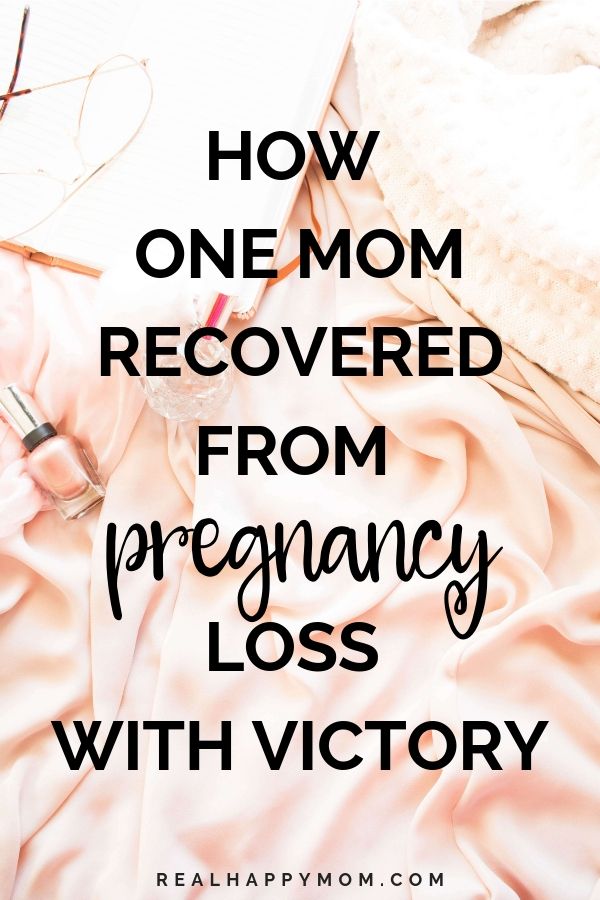Pregnancy is such an exciting time. Especially for new moms.
The worst is having that excitement stripped away with pregnancy loss.
If you have ever dealt with pregnancy loss, you have to check out this episode of the Real Happy Mom Podcast with Quenita.
She shares her story and how she was able to go from grief and despair from early pregnancy loss to pure joy when she brought her beautiful boy into the world.
About Quenita
Quenita or as many know her as Que, is a mom to a now 2-year-old.
She has been married to her husband for 5 years. Recently, Que made a career change from criminal justice to public health.
And currently works in HIV and Treatment in Tampa, Florida.

Que’s story of early pregnancy loss
In 2013 Que found out that she was pregnant. Naturally, she and her husband were excited and overjoyed by the news and couldn’t wait to share it with their family and friends.
Que and her husband didn’t have any preexisting conditions that would cause them to be concerned. Nor did Que have issues that would warrant concern at the beginning of her pregnancy.
She went through her first trimester with no issues. Que reached what most consider the safe mark at 12 weeks to announce that you are pregnant and she shared the news with her family and friends.
When I was 14 weeks pregnant. I remember that day like it was yesterday. I went to work and had sushi with my mom for lunch and I remember that I came home and in the middle of the night I felt like I needed to use the restroom. So I got up and I just felt an immense pressure. It wasn’t pain, it was just pressure.
When Que went to the bathroom and sat on the toilet, she heard a splash.
Her water had broken.

Remember, Que is only 14 weeks at this point.
So I’m like, am I dreaming? Like my water’s not supposed to break this early on, you know. What’s happening? So we called our doctors after hours number and they instructed us to go immediately to labor and delivery.
Once she reaches the hospital, they confirm that her water had broken. Not a leak, but her water broke and her body was going into labor.
That is when she received news that she would have to deliver at 14 weeks. Que endured the pain physically and emotionally of her first pregnancy loss.
Afterward, many tests were done to try to find out why she went to labor early. Doctors later concluded that it was just a spontaneous loss.
That didn’t really sit well with me. But at the time we were going to one of the top doctors in our city. So I kinda just took her word for it. And that was it. She said, you know, these things happen, you guys can try again immediately. And let’s just hope for the best. So as hard as that was and to digest, that’s exactly what we did.

Que’s second pregnancy
Later, in 2015 Que found out she was pregnant.
She time she was living in a new city. She found the best high-risk pregnancy doctor in the city.
Que questioned her doctor about precautions she should take during her pregnancy. And also made her doctor aware of her concerns since she had a pregnancy loss at 14 weeks.
Que made it a week before finding out the gender of the baby when she noticed an unusual amount of mucus one day at work.
She didn’t think anything of it until she noticed more in the evening when she was at home.
Que called her emergency line for her doctor and was advised to come in first thing in the morning.
When she went to the doctor the next morning she found out that her cervix was shortening and her body was going into labor.
She would have to be induced and deliver at 18 weeks.
This is the second pregnancy loss and Que is devasted.

Vaginal cerclage
After taking some time to grieve, Que asked her doctor what was causing her to have early pregnancy loss.
She casually mentioned, Oh, you could have an incompetent cervix, but you know, there is no real way of, you know, knowing that. And I said, okay, so what do we do to prevent this from happening again? And she recommended that during our next pregnancy, maybe at I think 16 weeks they could place a vaginal cerclage.
A vaginal cerclage or cervical cerclage is a suture or stitch that is placed at the cervix to prevent changes in the cervix that causes premature labor.
This is a surgical procedure that is typically placed when a woman is 12-14 weeks pregnant.
The success rate is up to 90% for women with an incompetent cervix.
Sutures are typically removed at 37 weeks or when your water breaks.
When Que heard that this was an option, she began to do her own research.

How Que did her own research and found Dr. Arthur Haney
I found that when I asked my doctors questions, a lot of times I was told basically like I was doing too much. Or you know, kind of questioning their medical expertise. But the way I saw it, I just wanted more information because you can’t just tell a mother who just delivered twice in their second trimester that these things just happen. Right. So I need it more answers.
Got second opinions
First, Que got second opinions from other doctors in the city.
She made sure to ask specifically about first-trimester loss and incompetent cervix. She consulted with doctors on what could be done to prevent future loss.
Que did her own research and found that there were many women that have an incompetent cervix.
She learned how common it was for women to have an incompetent cervix.
What was surprising is that there are not many doctors that treat this common problem.
But, then Que learned about Dr Arthur Haney.
Dr. Haney specializes in placing transabdominal cerclage for women who have in competent cervix and who have suffered multiple second trimester losses. And again, I feel like had I not done my own research, we may not have our son now because I feel like a lot of times, especially women of color, we’re not believed. Or we’re not when we have questions or concerns when it deals with our health or with our health issues. I feel like a lot of my requests for more information, a lot of my questions, a lot of the concerns that I had and that I share it with my doctors were not taken seriously. So I kind of had to take my future into my own hands.
As much as I love healthcare professionals and believe that they can do amazing things, they are not Jesus.
You know you’re body better than anyone. You know when things are off and when things are going great.
If you are getting conflicting information about the conditions you have, it is okay to question your doctor. Or do what Que did and do your own research.
Sometimes you have to take your future into your own hands and not rely on everyone else.

Used my good friend, Google
So how did Que use when she did her own research?
So it started of course with a Google search. Yes. Google is like my BFF.
Que search for a combination of online articles and scholarly articles, like research articles and medical publications,
She focused her search on first-trimester loss. Then began to learn more about the incompetent cervix and transabdominal cerclage.
Join online groups or chats
Que as joined online groups with other moms that have gone through pregnancy loss.
It was in an online group that Que first learned about Dr Arthur Haney in Chicago.
Dr. Haney specializes in placing transabdominal cerclage for women who have incompetent cervix and who have suffered multiple second trimester losses.
Once she learned about Dr Arthur Haney, she began to do researching the services he provides, his expertise and experience.
He has patients from all over the world. One that stood out for me was there was a woman who traveled all the way from India to see Dr. Haney to have this transabdominal cerclage placed. And that kind of did it for me.

What is a transabdominal cerclage?
A transabdominal cerclage is similar to a vaginal cerclage.
The major difference is transabdominal cerclage it’s a surgical procedure that goes through the lower abdomen where a surgeon places a band high on the cervix to support that cervix from opening or going into premature labor.
You would typically have this surgical procedure done before getting pregnant.
For women with an incompetent cervix, 99% of women successfully deliver with having a transabdominal cerclage.
The only downfall is you have to deliver via c-section.
If you are a mom that always wanted a vaginal birth, you may have to alter your birth plan so that you can have the birth story you always wanted.
After Que had a consultation with Dr Haney she knew that she had to take a chance. Thank goodness that she did.
Que did get pregnant and then delivered her baby boy shortly after having the transabdominal cerclage placed.

How Que was able to manage her emotions during pregnancy loss
Pregnancy loss is difficult physically and emotionally.
I’ve personally experienced an early pregnancy loss.
But I pushed most the memories out of my mind in order to cope and move on quickly.
I do remember it being extremely painful physically. But emotionally I felt some grief.
I asked Que how she was able to deal with the loss especially since she was much further along than I was.
Que was visibly pregnant with noticeable changes in her body. She had shared the good news with her family and friends and even started picking out names.
How to do you recover after something tragic as pregnancy loss?
It honestly can be because it’s not just the physical pain, which like you said, it’s very painful. It’s very, very, very painful physically, but emotionally as well. And it’s not something that you ever get over completely. It’s not something that you ever forget.
Find out what works for you
You have to determine what works best for you.
Que mentioned some people like to talk openly about what they’re feeling and have gone through.
Other people, like me, have to push things out of their mind. Everyone handles things differently and that’s okay.

Allow yourself to process your emotions
So I think it is or what I tried to remind myself that it is okay to feel what you’re feeling. You’re going to have some days where you know you’re just lost and you’re confused because you’re trying to figure out why and you can just why, why, why, why, why yourself all day. And it can just, you know, it can drive you crazy. You may have some days where you feel an immense amount of sorrow and sadness and it’s okay to feel that you may have some days where you feel angry and that’s okay too
Megan Hilluka on episode 28 echoed the same thing when she talked about losing her 15-month-old daughter.
Allow yourself to feel and process your emotions.
You will experience varying emotions. You are completely normal if you experience anger, confusion, depression, panic, anxiety, rage, hate, blame, and guilt.
Remember, if you need more help, seek the help of a professional.
A lot of times I’ve found that I would rush through my grieving process because I feel like number one, I need to be strong for myself and I can’t allow myself to unravel completely cause I have a husband, you know, that I also need to show support for because men grieve for the loss of pregnancies sometimes as much as you know, the woman does. So I want it to be that support system for him and I also need it to be strong for myself and I did not want to allow myself to just unravel completely. And also I think one of the uglier sides of being a professional woman is at the end of the day we’re still expected to show up and show out, you know, at work.

After time and allowing herself to process her feelings, Que is now able to speak openly about her story. Make sure to check out the second part of Que’s story. To learn more about Que check out her podcast, That’s my Que.

Subscribe & Review in iTunes
Have you subscribed to the Real Happy Mom podcast? If not, I’m encouraging you to do it today.
I don’t want you to miss any upcoming episodes. I am planning on adding some bonus episodes that you won’t find on this website, and if you’re not subscribed, you might miss out on those. Click here to subscribe in iTunes!
I would be so happy and grateful if you left me a review on iTunes too. Reviews help iTunes to know that this is a podcast for other moms so that other moms can find this podcast. Plus, it makes my day to read the reviews.
Just click here to review, select “Ratings and Reviews” and “Write a Review” and let me know what your favorite part of the podcast is. Thanks in advance!
Don’t have iTunes? You can subscribe to the podcast Google Podcast, Anchor, Spotify, Breaker, Castbox, Overcast, RadioPublic, and Stitcher.
